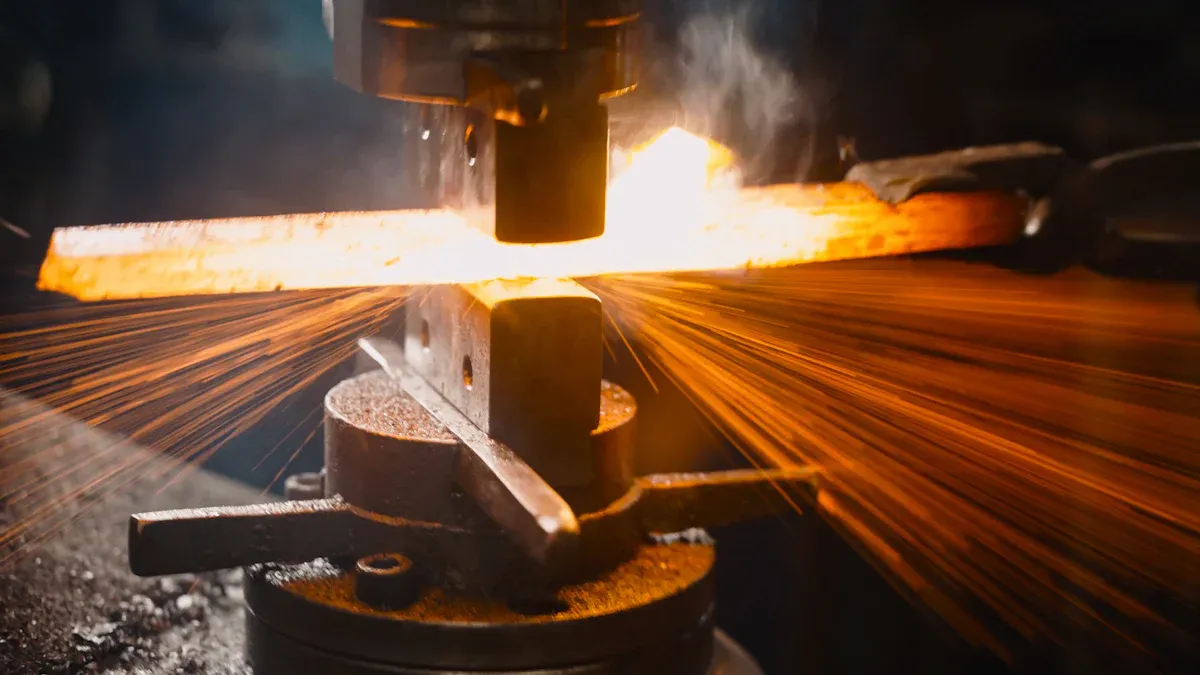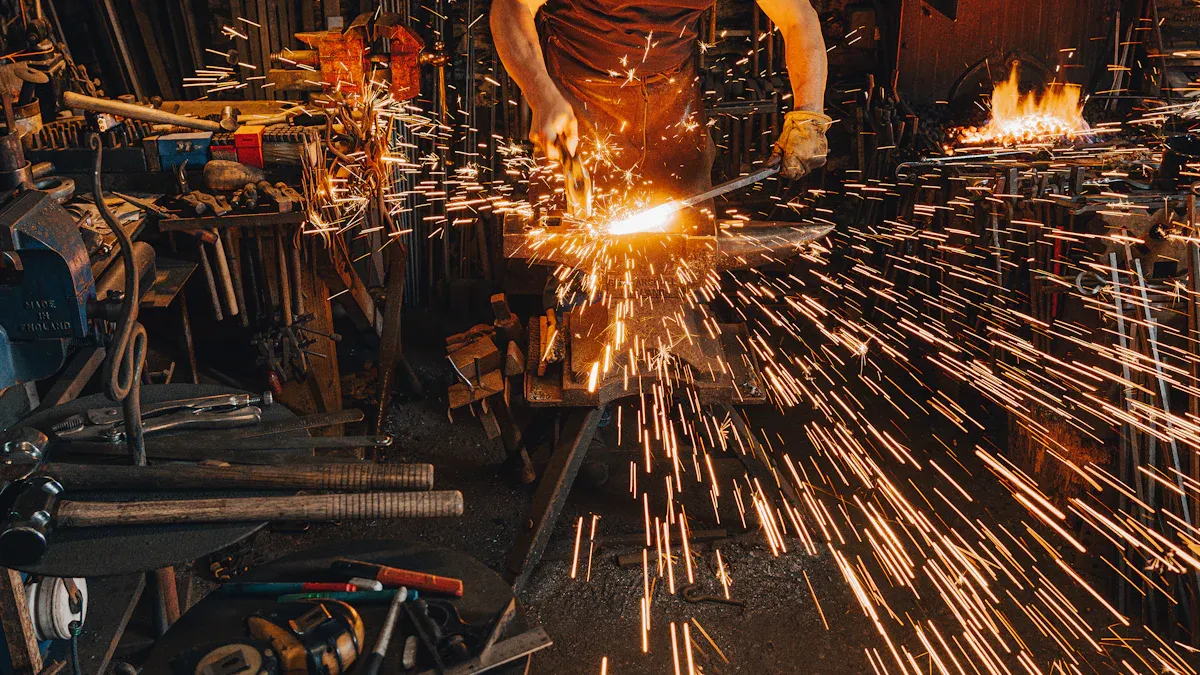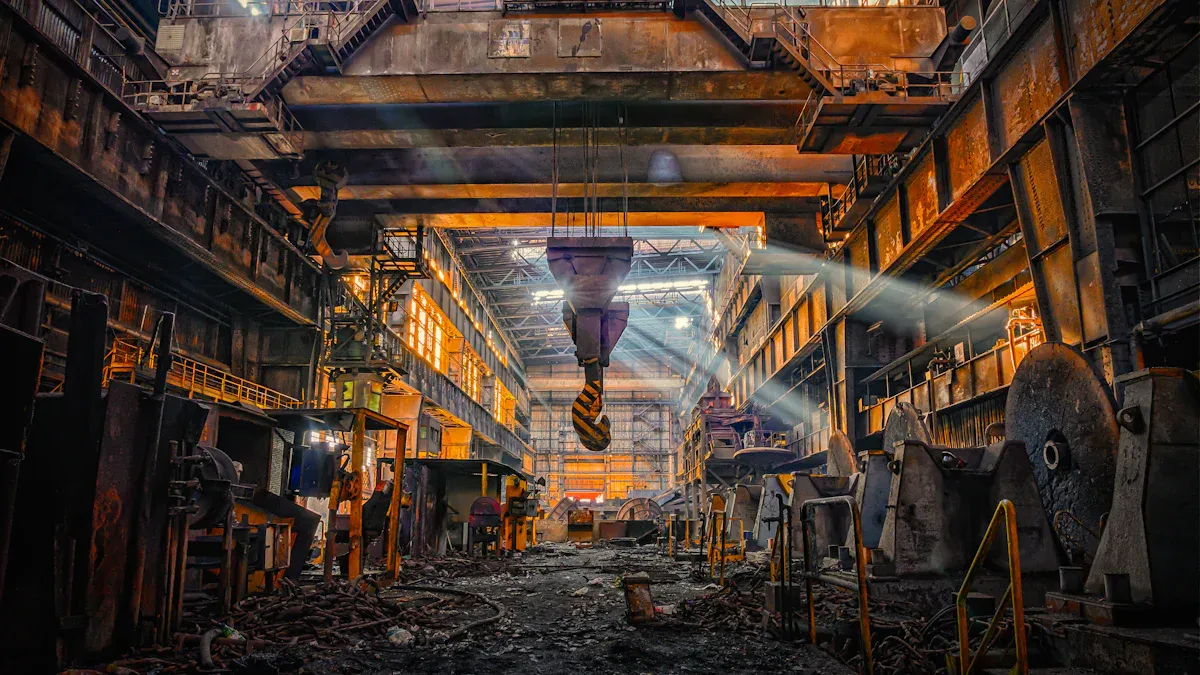
Forging manufacturing plays a huge role in shaping the modern world. You might not realize it, but the parts forged in factories are everywhere—from the cars you drive to the planes you fly in. Industries like automotive, aerospace, and construction rely heavily on forged components for their strength and durability. Without forging, many of the tools and machines we use daily wouldn’t exist.
This industry doesn’t just build products; it drives economies. Forging companies create jobs, boost exports, and support innovation. The top forging manufacturing companies in the world are at the heart of this progress, ensuring industries keep moving forward.
Key Takeaways
- Forging makes strong and long-lasting parts for cars and planes.
- Big companies like Bharat Forge and Thyssenkrupp are leaders.
- Many companies now use green methods to save energy and cut waste.
- More forged parts are needed for cars and clean energy projects.
- New tech like robots and smart tools improve forging speed and quality.
Leading Forging Companies in the World

Bharat Forge (India)
Overview of the company
Bharat Forge is one of the largest forging companies in the world, based in Pune, India. It’s part of the Kalyani Group and has been a leader in the forging industry for decades. The company specializes in producing high-performance components for industries like automotive, aerospace, and energy.
Key achievements and capabilities
Bharat Forge has achieved remarkable milestones. It’s known for its advanced manufacturing facilities and cutting-edge technology. The company has a strong global presence, with operations in over 10 countries. It also holds a reputation for producing lightweight yet durable components, which are essential for modern vehicles and machinery.
Unique contributions to the forging industry
What sets Bharat Forge apart is its focus on innovation. The company invests heavily in research and development to create sustainable and efficient forging processes. Its commitment to reducing carbon emissions has made it a pioneer in eco-friendly manufacturing.
Thyssenkrupp Forged Technologies (Germany)
Overview of the company
Thyssenkrupp Forged Technologies is a division of the German industrial giant Thyssenkrupp AG. It’s a global leader in forging and machining, serving industries like automotive, construction, and mining.
Key achievements and capabilities
This company is known for its expertise in producing crankshafts, axle components, and other critical parts. Its facilities use state-of-the-art technology to ensure precision and quality. Thyssenkrupp’s ability to handle large-scale projects makes it a preferred partner for many global brands.
Unique contributions to the forging industry
Thyssenkrupp stands out for its focus on digitalization. The company uses smart manufacturing techniques to improve efficiency and reduce waste. Its commitment to innovation has helped shape the future of the forging industry.
Precision Castparts Corp. (USA)
Overview of the company
Precision Castparts Corp., headquartered in Portland, Oregon, is a major player in the forging industry. It specializes in producing complex metal components for aerospace, power generation, and industrial applications.
Key achievements and capabilities
The company is renowned for its ability to create high-strength, lightweight parts. It’s a key supplier to the aerospace industry, providing components for aircraft engines and airframes. Precision Castparts also excels in using advanced materials like titanium and nickel alloys.
Unique contributions to the forging industry
Precision Castparts has revolutionized the forging process with its focus on precision and quality. Its expertise in working with advanced materials has set new standards in the industry. The company’s contributions have been vital in making modern aircraft safer and more efficient.
Scot Forge (USA)
Overview of the company
Scot Forge is a leading employee-owned forging company based in Spring Grove, Illinois. It has been in the forging business for over 125 years, making it one of the most experienced players in the industry. The company specializes in open-die and rolled-ring forging, serving industries like aerospace, defense, and energy.
Key achievements and capabilities
Scot Forge has built a reputation for delivering high-quality, custom-forged components. Its facilities house some of the largest forging presses in North America, allowing it to handle massive projects. The company also excels in quick turnaround times, which is a huge advantage for industries with tight deadlines.
Did you know? Scot Forge is known for its ability to forge parts weighing up to 300,000 pounds!
Unique contributions to the forging industry
What makes Scot Forge stand out is its employee-owned structure. This model fosters a culture of accountability and innovation. The company also prioritizes sustainability by using eco-friendly practices and recycling materials wherever possible.
Japan Casting & Forging Corporation (Japan)
Overview of the company
Japan Casting & Forging Corporation (JCFC) is a prominent name in the global forging industry. Headquartered in Kitakyushu, Japan, it specializes in producing large-scale forged and cast components for industries like shipbuilding, power generation, and petrochemicals.
Key achievements and capabilities
JCFC is renowned for its expertise in creating ultra-large forgings, such as turbine rotors and pressure vessels. Its advanced facilities and skilled workforce enable it to meet the stringent quality standards required by its clients. The company has also expanded its global footprint, supplying products to over 50 countries.
Unique contributions to the forging industry
JCFC has played a pivotal role in advancing forging technology. It has developed innovative techniques to produce components that can withstand extreme conditions, such as high pressure and temperature. This makes it a trusted partner for critical industries worldwide.
Aichi Forge USA (USA)
Overview of the company
Aichi Forge USA, a subsidiary of Aichi Steel Corporation in Japan, operates out of Georgetown, Kentucky. It focuses on precision forging for the automotive industry, producing components like gears, shafts, and bearings.
Key achievements and capabilities
Aichi Forge USA is known for its cutting-edge forging processes. The company uses advanced technology to create lightweight yet durable parts, which are essential for modern vehicles. Its commitment to quality has earned it partnerships with major automotive brands.
Unique contributions to the forging industry
Aichi Forge USA stands out for its focus on innovation. The company has pioneered forging techniques that reduce material waste and energy consumption. This not only lowers costs but also supports environmental sustainability.
Ellwood Group (USA)
Overview of the company
Ellwood Group, based in Pennsylvania, is a family-owned business that has been shaping the forging industry for over 100 years. It operates multiple facilities across the United States, offering a wide range of forged products. You’ll find their work in industries like aerospace, oil and gas, and defense.
Key achievements and capabilities
Ellwood Group is known for its ability to produce some of the largest and most complex forgings in the world. Their advanced facilities include open-die forging presses and state-of-the-art heat treatment processes. They also excel in creating custom solutions tailored to meet specific client needs.
Fun Fact: Ellwood Group can forge parts weighing up to 150 tons!
Unique contributions to the forging industry
What makes Ellwood Group unique is its focus on innovation and customer satisfaction. They’ve developed proprietary technologies to improve the strength and durability of their products. Their commitment to quality and precision has earned them a reputation as one of the top forging manufacturing companies in the world.
China First Heavy Industries (China)
Overview of the company
China First Heavy Industries (CFHI) is a state-owned enterprise located in Qiqihar, China. It specializes in producing heavy-duty forged components for industries like power generation, shipbuilding, and mining.
Key achievements and capabilities
CFHI is a leader in manufacturing ultra-large forgings, such as nuclear reactor pressure vessels and wind turbine shafts. Their facilities are equipped with some of the largest forging presses globally, allowing them to handle massive projects. They’ve also expanded their reach, exporting products to over 30 countries.
Unique contributions to the forging industry
CFHI stands out for its role in advancing China’s industrial capabilities. They’ve pioneered techniques for producing high-strength forgings that can withstand extreme conditions. Their contributions have been crucial in supporting China’s infrastructure and energy sectors.
Guizhou Aviation (China)
Overview of the company
Guizhou Aviation, based in Guiyang, China, is a key player in the aerospace forging industry. It focuses on producing high-precision components for aircraft and defense applications.
Key achievements and capabilities
The company is known for its expertise in creating lightweight yet durable parts. They use advanced materials like titanium and aluminum alloys to meet the demanding requirements of the aerospace sector. Their products are used in both military and commercial aircraft.
Unique contributions to the forging industry
Guizhou Aviation has made significant contributions to the aerospace industry. They’ve developed innovative forging techniques that enhance the performance and safety of aircraft. Their work has positioned them as a trusted supplier in the global aerospace market.
Wuxi Paike New Materials (China)
Overview of the company
Wuxi Paike New Materials is a prominent forging company based in Wuxi, China. It specializes in producing high-quality forged components for industries like aerospace, energy, and transportation. The company has gained recognition for its expertise in manufacturing seamless rolled rings and other precision-forged products. With a strong focus on innovation, Wuxi Paike has become a trusted name in the global forging market.
Fun Fact: Wuxi Paike’s seamless rolled rings are used in some of the world’s most advanced wind turbines!
Key achievements and capabilities
Wuxi Paike has achieved remarkable milestones over the years. Here’s what makes them stand out:
- Advanced Technology: The company uses cutting-edge forging techniques to produce components with exceptional strength and durability.
- Global Reach: Wuxi Paike exports its products to over 40 countries, serving clients in diverse industries.
- Specialized Expertise: They excel in creating large-diameter rolled rings, which are critical for applications like wind energy and aerospace.
Their ability to handle complex projects has earned them partnerships with leading global brands. You’ll find their work in everything from aircraft engines to industrial machinery.
Unique contributions to the forging industry
Wuxi Paike has made significant contributions to the forging world. Their focus on sustainability sets them apart. They’ve developed eco-friendly forging processes that reduce waste and energy consumption. This commitment to green manufacturing aligns with the growing demand for environmentally responsible practices.
Additionally, Wuxi Paike invests heavily in research and development. They’re constantly exploring new materials and techniques to improve the performance of their products. Their dedication to innovation has helped push the boundaries of what’s possible in forging.
Tip: If you’re looking for a company that combines quality, innovation, and sustainability, Wuxi Paike is a name to remember!
Trends in the Forging Industry

Technological Advancements
Automation and robotics in forging
Have you noticed how robots are taking over repetitive tasks in industries? Forging is no exception. Automation and robotics have transformed the way forging companies operate. Robots now handle tasks like material handling, die lubrication, and even quality checks. This reduces human error and speeds up production. For you, this means faster delivery of high-quality products.
Tip: Companies using robotics often produce more consistent and reliable components.
Use of advanced materials
The forging industry is also exploring new materials. Lightweight metals like titanium and aluminum are becoming popular. These materials are strong yet light, making them perfect for industries like aerospace and automotive. If you’ve ever wondered how airplanes stay so light yet durable, advanced materials are the answer.
Market Growth and Demand
Increasing demand in automotive and aerospace sectors
The automotive and aerospace industries are booming. You’ve probably seen electric vehicles (EVs) gaining popularity. EVs need lightweight, durable parts, which forging companies excel at producing. Similarly, the aerospace sector demands high-precision components for aircraft. This growing demand keeps the forging industry thriving.
Expansion in emerging markets
Emerging markets in Asia, Africa, and South America are driving growth. These regions are investing in infrastructure and manufacturing, creating a huge demand for forged components. If you’re in these markets, you’ll likely see more local forging companies stepping up to meet the demand.
Sustainability in Forging
Eco-friendly forging processes
Sustainability is a big deal now, and forging companies are catching on. Many are adopting eco-friendly processes, like using renewable energy and recycling materials. This helps reduce their carbon footprint.
Reduction of waste and energy consumption
Forging companies are also finding ways to cut waste and save energy. Techniques like near-net-shape forging minimize material waste. For you, this means more sustainable products that don’t compromise on quality.
Note: Supporting companies with green practices can make a difference for the planet!
Challenges and Opportunities in the Forging Industry
Challenges
Rising raw material costs
You’ve probably noticed how prices for everything seem to be going up. The forging industry isn’t immune to this. Steel, aluminum, and other essential materials have seen significant price hikes. This makes it harder for forging companies to keep costs low while maintaining quality.
Why does this matter to you? Higher raw material costs can lead to pricier products, whether it’s a car, a plane ticket, or even construction equipment.
To tackle this, companies are exploring ways to use materials more efficiently. Recycling and sourcing alternative materials are becoming popular strategies.
Competition from alternative manufacturing methods
Forging isn’t the only game in town. Methods like 3D printing and casting are gaining traction. These alternatives can sometimes produce parts faster or cheaper. For forging companies, this means staying competitive is a constant challenge.
But here’s the thing: forged components are often stronger and more durable than those made with other methods. That’s why industries like aerospace and automotive still rely heavily on forging.
Opportunities
Growth in renewable energy sectors
The renewable energy boom is creating exciting opportunities for forging companies. Wind turbines, solar panels, and hydroelectric systems all need forged components. For example, the massive shafts in wind turbines are often forged for strength and reliability.
Fun Fact: Some of the world’s largest wind turbines use forged parts to withstand extreme weather conditions!
If you’re interested in green energy, this is great news. Forging companies are helping to build a more sustainable future.
Innovations in forging technology
Technology is changing the game. Advanced forging techniques, like near-net-shape forging, are reducing waste and improving efficiency. Automation and robotics are also making production faster and more precise.
For you, this means better products at potentially lower costs. Plus, these innovations are paving the way for eco-friendly manufacturing, which benefits everyone.
Tip: Keep an eye on companies investing in new technologies—they’re shaping the future of forging!
The forging industry plays a vital role in shaping the world around you. Companies like Bharat Forge, Thyssenkrupp, and Precision Castparts have revolutionized manufacturing with their innovative techniques and high-quality components. Their contributions power industries like automotive, aerospace, and energy, ensuring progress and reliability.
Why does this matter to you? Forging drives industrial growth, creates jobs, and supports economies worldwide.
Looking ahead, the future of forging looks bright. With advancements in automation and eco-friendly processes, you can expect stronger, lighter, and more sustainable products. The industry is evolving to meet global demands while reducing its environmental footprint. Exciting times lie ahead for forging!
FAQ
What is forging, and why is it important?
Forging is a manufacturing process where metal is shaped using compressive forces. It’s important because it creates strong, durable components used in industries like automotive, aerospace, and construction. Forged parts are essential for safety and reliability in critical applications.
How does forging differ from casting?
Forging shapes metal through pressure, while casting pours molten metal into molds. Forged parts are stronger and more durable. Casting, however, is better for complex shapes. Choose forging when strength and reliability matter most.
Tip: Forging is ideal for parts that face high stress or extreme conditions.
Which industries rely most on forging?
You’ll find forging in industries like:
- Automotive: Engine parts, gears, and axles.
- Aerospace: Aircraft engines and landing gear.
- Energy: Wind turbines and power plants.
Forging ensures these industries get components that can handle tough conditions.
Are forged products eco-friendly?
Yes, many forging companies now use eco-friendly processes. They recycle materials, reduce waste, and adopt energy-efficient methods. This helps lower their carbon footprint while producing high-quality parts.
Note: Supporting companies with green practices helps promote sustainability.
What are the benefits of forged components?
Forged components offer:
- Strength: They’re tougher than parts made by other methods.
- Durability: They last longer under stress.
- Precision: Modern forging ensures accurate shapes and sizes.
These benefits make forging a top choice for critical applications.
Post time: Mar-14-2025



